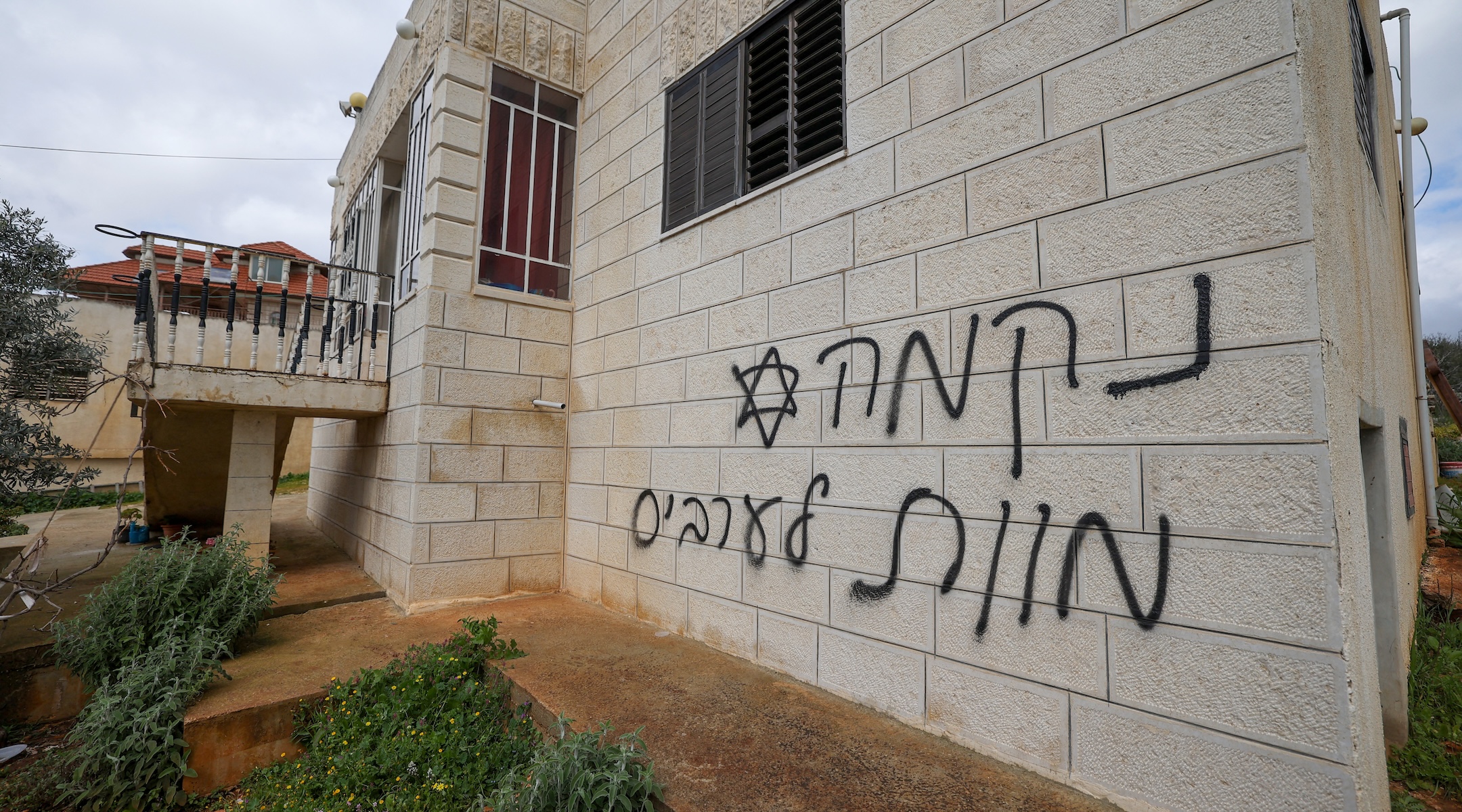US announces sanctions on Israel’s Hilltop Youth movement over West Bank violence
The informal movement forms a core of extremist settler activity

An anti-Palestinian slogan in Hebrew, which reads “Revenge” and “Death to Arabs” is seen on a Palestinian home after a reported attack by Israeli settlers in the village of Turmus Aiya near Ramallah in the West Bank, on Feb. 18, 2024. (Jaafar Ashtiyeh/AFP)
(JTA) — The United States imposed sanctions on Israel’s Hilltop Youth, an extremist movement of Jewish settlers known for establishing illegal outposts and attacking Palestinians in the West Bank.
Also targeted in Tuesday’s sanctions announcement were two Israeli men: Eitan Yardeni, whom the U.S Treasury described as linked to violence against Palestinian civilians in the West Bank, and Avichai Suissa, the leader of Hashomer Yosh, which the administration added to the sanctions list in July over its alleged support for sanctioned Israeli extremists.
The announcement of the sanctions by the U.S. Treasury represents the latest response by the Biden administration to escalating violence in the West Bank.
“The worsening violence and instability in the West Bank are detrimental to the long-term interests of Israelis and Palestinians, and the actions of violent organizations like Hilltop Youth only exacerbate the crisis,” Bradley T. Smith, acting under secretary of the Treasury for terrorism and financial intelligence, said in a statement.
The Biden administration has said it hopes the sanctions will compel the government of Israeli Prime Minister Benjamin Netanyahu to crack down on extremists whose actions threaten to destabilize the region.
Unlike the typical targets of sanctions, such as individuals or organizations, Hilltop Youth is an informal group with no established membership or charter. The Treasury’s listing for Hilltop Youth defines it as a “criminal organization.”
The term “hilltop youth” emerged decades ago to describe a phenomenon of young Israeli settlers who occupied hilltops in the West Bank, in violation of Israeli law, in an effort to create new Jewish settlements. Their efforts, which sometimes have proved successful, often included threatening or attacking nearby Palestinians. Over time, the so-called Hilltop Youth became known for what they called “price tag” attacks, acts of revenge targeting Palestinians or Israelis, including military bases or vehicles, perceived to be enemies or obstacles to the settlement movement.
“Hilltop Youth has devastated Palestinian communities and carried out killings, mass arson, and other so-called ‘price tag’ attacks to exact revenge and intimidate Palestinian civilians, and has repeatedly clashed with the Israeli military as it counters their activities,” the Treasury said in its announcement.
According to the Treasury, extremists affiliated with the Hilltop Youth have vandalized churches and mosques, uprooted Palestinian olive trees and spray-painted Palestinian homes with racist slogans.
The Treasury attributed two specific incidents to Hilltop Youth. The first took place in June 2023, when hundreds of Hilltop Youth raided the Palestinian town of Turmus Aiya in an attack that included arson of homes and fields and left one Palestinian dead. The other incident, in April, targeted the village of al-Mughayyir, and featured beatings, arson, and looting, and resulted in another Palestinian death.
The Hilltop Youth form the core of a Jewish extremist movement in the West Bank whose broader ideology has adherents in the highest levels of the Israeli government. Itamar Ben-Gvir, Israel’s national security minister, was a member of extremist movements and was previously convicted of supporting a terrorist organization.
Under U.S. law, any financial institution doing business in or with the United States is required to freeze assets belonging to targets of sanctions and to block financial transactions involving them.













